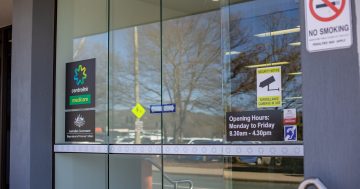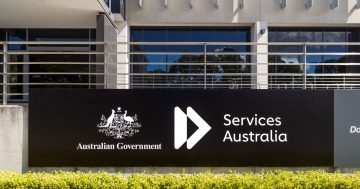
News laws have raised the penalty for harming or threatening frontline Commonwealth workers. Photo: Julia Gomina.
Frontline Centrelink workers now have greater protection from violent and aggressive attacks, with new laws introducing harsher penalties for offenders.
The laws also protect staff interacting with the public working across a range of other Commonwealth agencies, such as passport offices, the Australian Electoral Commission, airports, and the Australian Tax Office.
The passage of the Criminal Code Amendment (Protecting Commonwealth Frontline Workers) Bill 2024 means the penalty for “conduct that causes harm” to a Commonwealth frontline worker will increase from a maximum of 10 years to 13 years’ imprisonment.
The penalty for “conduct that threatens to cause serious harm” to a Commonwealth frontline worker will increase from a maximum of seven years to nine years’ imprisonment.
Following the stabbing attack on Centrelink Airport West Services Australia officer Joeanne Cassar in May last year, Government Services Minister Bill Shorten commissioned a review into the safety of frontline public service workers.
That review recommended harsher penalties for assaulting Commonwealth workers.
The bill, which passed last week, implements recommendation 18 of the Services Australia Security Risk Management Review, conducted by Graham Ashton.
Mr Shorten said frontline workers had increasingly been the target of violence or aggression just for doing their jobs.
So far in the past 12 months, Services Australia staff have experienced nearly 9000 face-to-face customer aggression incidents at service centres, with almost the same number happening the previous year.
“In light of the dreadful attack on Joeanne Cassar, I promised our Labor Government would increase security and safety for the thousands of people who work at Services Australia, and the millions of Australians who use Services Australia offices,” Mr Shorten said.
“The legislation builds on the extensive work done by this government to ensure all Australians are safe in the workplace.
“These amendments send a strong message that Commonwealth frontline workers are valued, and that violence and aggression towards them is unacceptable.”
Mr Shorten said the government had committed to implementing all 44 of the review’s recommendations, including the introduction of workplace protection orders in Commonwealth workplaces.
In addition, $46.9 million was committed in 2023-24 and a further $314.1 million in the 2024-25 Budget to enhance safety and security at Services Australia’s service centres for staff and customers.
Attorney-General Mark Dreyfus said Commonwealth frontline workers helped the Australian community access essential government services and were among the first on the scene to assist following emergencies and natural disasters.
“The Albanese Government deeply values the work done by all our frontline public servants. Every day they help people to access government services, support and payments,” Mr Dreyfus said.
“Violence and aggression towards those workers will not be tolerated. All Australians, no matter where they work, have the right to a safe, secure and respectful workplace.”
The Community and Public Sector Union welcomed the passing of the legislation, noting that incidents of violence and aggression were “unfortunately, not uncommon”.
CPSU deputy national president Matthew Harrison said: “Frontline Commonwealth workers, such as those in Services Australia, the AEC, Border Force, the passport office and electorate offices, play a critical role in providing essential support to Australians, often in challenging circumstances.
“The harsh reality of these public-facing roles is that staff are far too often dealing with incidents of physical violence, threats and verbal abuse. This is unacceptable.
“It’s crucial that staff be able to do their important work knowing they’ll be safe from any acts of violence or aggression.
“The urgent need for enhanced security and protections for workers has been a longstanding priority fought for by workers over many years.
“The CPSU has been pleased to see a government finally acknowledge the need to prioritise worker safety as an integral part of public service delivery.”





















